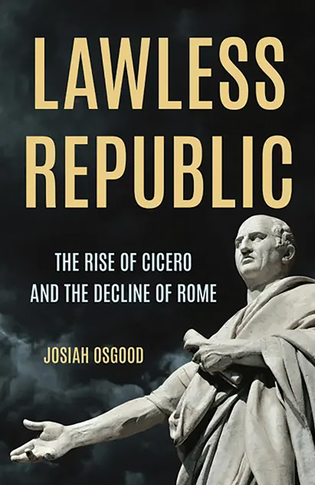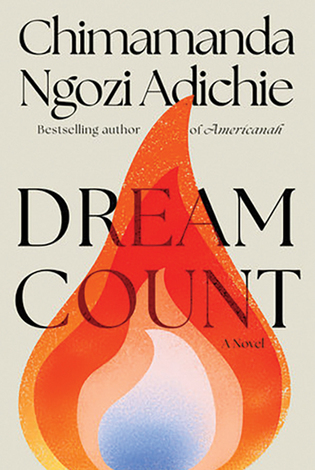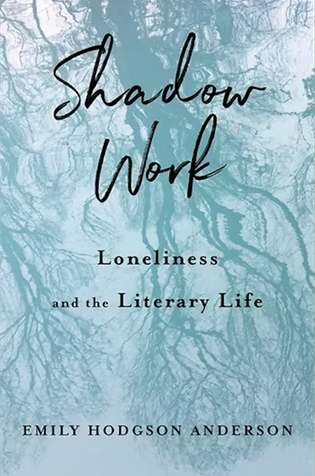
Lawless Republic: The Rise of Cicero and the Decline of Rome
Josiah Osgood ’96, ’02PHD
Basic Books, $32
Reviewed by Robert Cioffi
How do republics end? For Marcus Tullius Cicero—the most famous and feared lawyer in Rome—the end came in 43 BCE just outside his seaside villa at Formia, halfway between Rome and Naples. He was killed in a brutal political murder that was sanctioned by the highest authorities of the state. His head and one or both of his hands were cut off and sent to Rome. A decade or so later, the man we know as Augustus would transform the Roman Republic into an empire ruled by a single individual.
Cicero began life as a political outsider. In court, he won stunning victories. Gaius Verres, whom he prosecuted for corruption, fled before the trial concluded. At age 42, Cicero was elected consul, the highest political office in Rome. That year was the high point of his career. When Lucius Sergius Catiline lost the election for the consulship, he hatched a populist plot to attack the Senate and overthrow the government. Cicero discovered the conspiracy, denounced it, and led the Senate to order the conspirators’ execution without trial. He was called the savior of the city. Five years later, the decision not to try them gave his enemies cause to drive him into exile.
In Lawless Republic: The Rise of Cicero and the Decline of Rome, Josiah Osgood ’96, ’02PhD, follows the intersecting trajectories of Cicero and the Roman Republic. This is a period of Roman history to which there are few witnesses more influential and none more prolific than Cicero. His speeches—equal parts hearsay and character assassination, often turning on questions of probability rather than hard evidence—would be largely inadmissible in an American courtroom. Yet, we would know much less without them and without his letters, which provide an extraordinary window into his life: the fortunes of his family, his pride at his successes, his disappointments at his failures, and the complex motivations that drove him.
Cicero was a complicated figure. He was a champion for free elections and the rule of law, but he was also willing to inflame Roman misogyny and xenophobia, to overlook the plight of Romans most in need, and to violate republican principles when it suited his purposes. For all that Cicero hoped to save Rome, he was victim to increasing political violence and instability, some of which he was responsible for. Ultimately, however, Osgood sympathizes with Cicero: “Without law, there is no limit on revenge.”
Robert Cioffi is associate professor of classics at Bard College.
__________________________________________________________________

Dream Count
Chimamanda Ngozi Adichie’08MA
Knopf, $32
Reviewed by Rebecca Steinitz ’86
Dream Count, Chimamanda Ngozi Adichie’s pandemic novel, hits the requisite notes of anxiety, isolation, hand sanitizer, and Zoom calls. But here, Covid-19 frames another subgenre: the narrative of four women whose professional challenges, romantic journeys, and complicated friendships illuminate a cultural time and space. (See Class Reunion, Waiting to Exhale, Sex and the City, et al.) In Adichie’s iteration, a quartet of unmarried West African 40-somethings navigates globalization, migration, economic stratification, and unfinished feminism.
As the world shuts down, ultrarich travel writer Chia, alone in her suburban DC mansion, revisits her “dream count”: the litany of men who couldn’t—or wouldn’t—satisfy her “longing” (the novel’s keyword) “to be known, truly known, by another person.” Her childhood friend Zikora, an affluent DC lawyer, has a similar litany, but finds the family she longs for in unexpected form. Chia’s cynical cousin Omelogor is “mistress of all I survey” at her Nigeria mansion, fruit of the fortune she “wanted and wanted” and earned, albeit suspiciously. In restitution, she gives “Robyn Hood” grants to entrepreneurial village women; though she has little use for men who don’t work for her, she works to improve the sex through her website, For Men Only.
By contrast, Kadiatou, Chia’s housekeeper, grew up in a village in Guinea, has faced more tragedy and brutality than one woman should bear, and wants only to raise her daughter and open a restaurant. But she has been raped by a VIP guest at the hotel where she works, and the three wealthy Nigerian women are supporting her through an equally brutal, unwanted—and public—investigation.
Adichie writes beautifully, especially in the particulars. If she sometimes lays it on a bit thick with terrible men, needy women, repellent Americans (especially academics), and the stoic, nurturing working-class woman, there is real truth beneath her broad strokes. Ultimately, when Dream Count grants grace and connection, they are well deserved.
Rebecca Steinitz ’86 is a Boston-based literacy consultant, editor, and freelance writer.
_________________________________________________________________

Shadow Work: Loneliness and the Literary Life
Emily Hodgson Anderson ’04PHD
Columbia University Press, $30
Reviewed by Sylvia Brownrigg ’86
As the habit of reading books recedes—especially the reading of physical books, quietly and alone, rather than listening to audiobooks when out multitasking—there seems a paradoxical rise in meta-books about books, books that celebrate reading: Pamela Erens ’85’s memoir about rereading Middlemarch, for example, or Peter Orner’s Am I Alone Here? Emily Hodgson Anderson’s meditative essay collection canvasses her deep connections to certain authors and stories and how they intersect with the emotional weather of her own life. She writes of her work as a mother, an English professor, and a person for whom reading has always held a cherished place. “Books gave one permission to sit in stillness,” Anderson says, describing her childhood home.
Distributing her essays in sections called “Losing,” “Longing,” and “Loving,” Anderson discusses writers old and new, linking Shakespeare with Alexander Chee in one chapter, Wittgenstein with Percival Everett, or Homer with Virginia Woolf, in others. Anderson is appealingly wide-ranging and associative, not so much making arguments as tracing thematic lines that lead improbably from one author to another.
Though her book’s prevalent setting is the academy, its emotional foundation is family life: Anderson’s readings are interwoven with memories of her childhood and accounts of raising her two sons. Anderson grew up surrounded by books and scholarship. “Books were offered to us as a form of comfort, companionship, and rest,” she writes, and this gentle, amiable volume provides a similar gift.
Sylvia Brownrigg ’86 is the author of seven works of fiction and a memoir, The Whole Staggering Mystery.
 loading
loading

